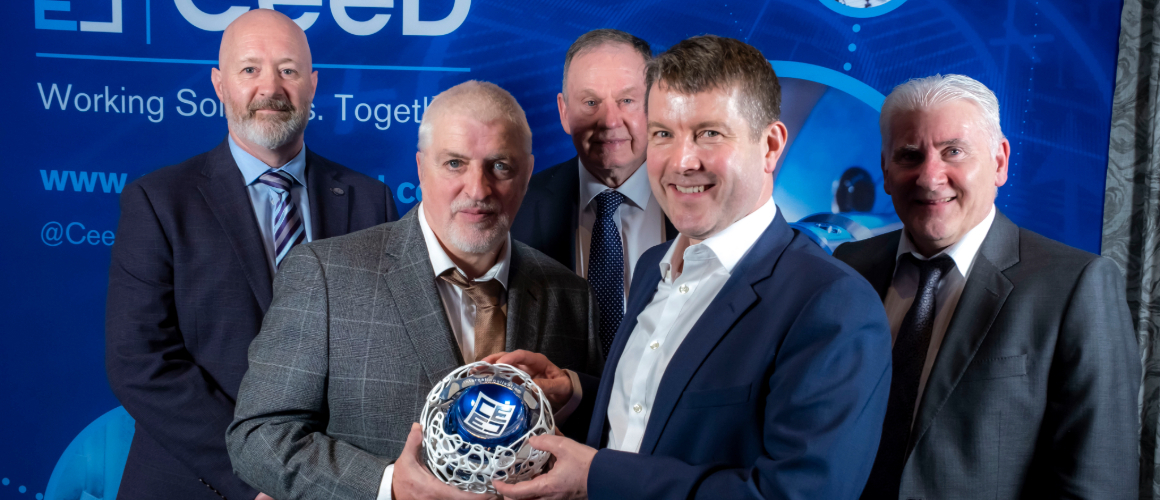Forth Valley College have won a top prize at the prestigious annual Centre for Engineering Education and Development (CeeD) Industry Awards.
The College was presented with the Internationalisation Award at a ceremony in the Glasgow Hilton on Thursday 6 March, attended by more than 700 people and hosted by journalist and broadcaster Shereen Nanjiani. FVC also made the final three in the categories of Innovation and Operational Excellence, but just missed out on these awards.
CeeD is a recognised national body supporting a range of industry sectors in Scotland, bound together by a common aspiration to improve operational efficiency, effectiveness and ultimately the bottom line through peer-to-peer knowledge exchange.
Now in its sixth year their successful and now well established awards recognise and celebrate the achievements of some of the best established and rising-star businesses and individuals in Scotland.
In the Internationalisation category the submission highlighted the BP Mauritania and Senegal National Apprentice Technician Training Programme, a partnership between Forth Valley College (FVC), Glasgow Caledonian University (GCU), and BP, where FVC has trained 46 apprentice technicians in production, mechanical, instrumentation, and electrical fields.
The program equipped technicians from Mauritania and Senegal with SVQ and HNC delivered qualifications at the FVC Falkirk Campus, before embarking on the SVQ3 across the globe. Supported by a £2.1 million investment, the program contributes to BP's world-class gas field development in West Africa, reflecting Scotland’s role as a global centre of vocational excellence. Technicians are now on track to complete their qualifications by January 2025.
Kenny MacInnes, Principal of Forth Valley College, said: “Winning this Ceed award for Internationalisation is great recognition for a project that we were absolutely delighted to be a part of. The BP Mauritania and Senegal National Apprentice Technician Training Programme was a great example of partnership working with the College, Glasgow Caledonian University and BP and it proved to be very successful, so a big well done to everyone who was involved.
“We were also delighted to have been shortlisted for two other awards. Unfortunately we did not win these, but this recognition once again showcases further great examples of the types of best practise Forth Valley College promotes across a wide range of industry sectors, and highlights the excellent initiatives we are involved with in making learning work.”
The submission for the Innovation category focussed on how FVC has revolutionised welding education by introducing mobile augmented reality (AR) welding simulators. This pioneering initiative enhances accessibility for under-represented groups, promotes diversity, and significantly reduces training costs, material waste, and emissions. By integrating AR into the curriculum, FVC engages hundreds of school pupils annually in STEM-focused outreach, while training over 320 apprentices over four years with industry-aligned, essential skills in a safe, sustainable environment. The initiative supports Scotland’s Net Zero ambitions and addresses critical skills gaps, exemplifying a transformative business model that empowers a future-ready workforce and advances engineering education for all.
The Operational Excellence submission showcased the College setting the standard for operational excellence in engineering education by driving innovation, fostering strategic partnerships, and embracing advanced technology. FVC annually trains around 1,100 apprentices, collaborating with over 350 employers and addressing critical skills shortages in Scotland’s engineering sector. Through initiatives such as the £4 million Skills Transition Centre (STC) and augmented reality welding simulators, we are able to champion sustainability, inclusivity, and Net Zero goals. Strategic alliances with industry leaders like Babcock International, Scottish Power, MacTaggart Scott and INEOS demonstrates our ability to deliver workforce-ready talent, highlighting our transformative contributions to vocational training and regional economic growth.



